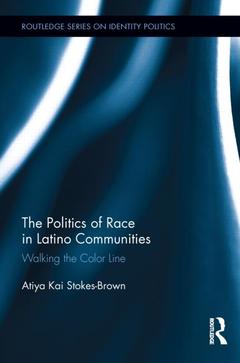The Politics of Race in Latino Communities Walking the Color Line Routledge Series on Identity Politics Series
Auteur : Stokes-Brown Atiya Kai

Latinos are the fastest growing population group in the U.S. and have exerted widespread influence in numerous aspects of American culture from entertainment to economics. Unlike Asian, black, white, and Native Americans who are defined by race, Latinos can be of any race and are beginning to shed new light on the meanings and political implications of race. As the Latino population grows, how will Latinos come to define themselves racially given the long standing social order of black and white? What are the political implications of their chosen racial identities? How does Latinos? racial identity influence their political behavior and motivation for participation?
The Politics of Race in Latino Communities is an innovative examination of development and political consequences of Latino racial identity in the U.S. Drawing on a national political survey of Latinos and focus group interviews, the book shows that development of Latino racial identity is a complex interaction between primordial ties, institutional practices, individual characteristics, and social interactions. Furthermore, the book highlights the political relevance of identity, showing that racial identity has meaningful consequences for the political attitudes, opinions, and behaviors of Latinos. An important piece of research propelling new discussions and insights into Latino politics.
1. Introduction Part 1: The Formation of Racial Identity 2. The Meaning and Measurement of Race 3. The Foundations of Latino Racial Identity Part 2: The Political Significance of Latino Racial Identity 4. Explaining Latino Political Orientations: The Role of Racial Identity 5. Racial Identity and the Politics of Latino Partisanship 6. The Impact of Race on Latino Political Participation 7. Latino Racial Identity and the Dynamics of Public Opinion Part 3: Conclusions and Implications 8. The Study of Latinos, Race, and American Politics: Where Do We Go From Here? Appendix A: Select Variables from LNS Questionnaire. Appendix B: Focus Group Questionnaire
Atiya Kai Stokes-Brown is an assistant professor in the Department of Political Science at Bucknell University, USA. Her research focuses on the political incorporation of women and racial/ethnic groups into the American political system, and issues of representation.
Date de parution : 08-2012
15.2x22.9 cm
Disponible chez l'éditeur (délai d'approvisionnement : 14 jours).
Prix indicatif 178,41 €
Ajouter au panierDate de parution : 04-2015
15.2x22.9 cm
Disponible chez l'éditeur (délai d'approvisionnement : 14 jours).
Prix indicatif 48,88 €
Ajouter au panierThème de The Politics of Race in Latino Communities :
Mots-clés :
Latino National Survey (LNS); Latino; Race; identity; public opinion; participation; representation; African American; Afro-Latino; Race Latinos; Black Latinos; White Latinos; Latino National Origin Groups; Linked Fate; Latino Politics; Race Respondents; Nonelectoral Activities; non-White Racial Identity; Nonelectoral Participation; El Salvadorans; Latino Political Participation; Latino Partisanship; Latino Attitudes; Policy Issues; Racial Identity Choices; Support Government Intervention; Hispanic Origin Question; Ordered Probit Regression Models; Coethnic Candidate; External Efficacy; Partisan Attachment; Liberal Immigration Policies; Democratic Partisanship; African American Public Opinion



